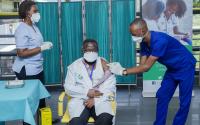[ad_1]
Adults older than 40 with Down syndrome are about three times more likely to die of COVID-19 than the rest of the population, pointing to the need to prioritize coronavirus vaccination to this group, a study published yesterday in the Lancet’s EClinicalMedicine has found.
A team led by Emory University researchers conducted the international online survey of the clinicians or caregivers of 1,046 patients with Down syndrome diagnosed as having COVID-19 from April to November 2020.
The results were compared with those of a UK survey of 59,025 hospitalized COVID-19 patients, 109 of them with Down syndrome, from February to July 2020. One-hundred of the 109 Down syndrome patients had complete age, sex, and ethnicity data and were included in the survey.
The researchers found a steep increase in death rate among hospitalized Down syndrome patients starting at age 40 (relative risk [RR], 3.5 vs 2.9 in the UK survey), while the death rate increased among patients without the genetic condition at age 60. After adjustment for known COVID-19 risk factors for death, the RR for death among Down syndrome patients was 2.5.
Thirteen percent of the 1,046 COVID-19 patients with Down syndrome died at, on average, 51 years. Death rates for hospitalized Down syndrome patients younger than 40 were low but still elevated compared with those of the general population (7% vs 3%).
Table of Contents
More COVID complications
Clinicians, who were asked about medical complications, reported that 60% of Down syndrome patients developed COVID-19 complications, particularly problems with the lungs, which were linked to higher death rates.
The most common complications included viral pneumonia (36%), acute respiratory distress syndrome (ARDS, 34%), secondary bacterial pneumonia (17%), and septic shock (11%). Down syndrome patients with coronavirus-related pneumonia were more likely to die of viral pneumonia than controls (57% vs 23%).
Mean age of Down syndrome patients in the international survey was 29 years (standard deviation, 18). Most were from Europe, the United States, Latin America, and India.
Down syndrome patients’ most common COVID-19 signs and symptoms included fever, cough, and shortness of breath, similar to those of other coronavirus patients. While joint and muscle pain and nausea or vomiting were less common in Down syndrome patients, altered consciousness and confusion were more common, especially in those 40 years and older.
About half of the Down syndrome patients (56%) were hospitalized, with 50% of them admitted to an intensive care unit and 29% requiring mechanical ventilation. In addition to the risk factors for hospital admission and death also found in the general population, congenital heart defects made Down syndrome COVID-19 patients more prone to requiring hospitalization.
Prioritization for vaccination
The impaired immunity and pro-inflammatory profile linked to Down syndrome may predispose these patients to more severe viral illnesses, the study authors noted. Other risk factors, such as obesity, conditions related to premature aging (eg, Alzheimer’s disease), diabetes, craniofacial abnormalities, and other comorbid conditions may contribute to an increased risk of respiratory tract infections.
In addition, Americans and Europeans over 40 with Down syndrome often live in group homes, other assisted-living facilities, or nursing homes, putting them at increased risk for infections from other residents and staff, the researchers said, noting that this was not a significant factor for higher coronavirus death rates in their study.
Lead author Anke Huels, PhD, of Emory University, said in a Case Western Reserve University press release that the study shows that patients with Down syndrome often have more severe symptoms at hospitalization and are prone to lung complications linked to increased risk of death from COVID-19. “These results have implications for preventive and clinical management of COVID-19 patients with Down syndrome and emphasize the need to prioritize individuals with Down syndrome for vaccination,” she said.
Coauthor Alberto Costa, MD, PhD, of Case Western, noted in the release that the US Centers for Disease Control and Prevention has, based partly on the study findings, classified Down syndrome as a high-risk condition that should be prioritized for COVID-19 vaccination. “Similar decisions have been made in the United Kingdom and Spain, and we hope that other countries will soon follow,” he said.
A UK study published Oct 21, 2020, in the Annals of Internal Medicine found that adults with Down syndrome were at nearly five times the risk of COVID-19 infection and 10 times the risk for related death. Huels and colleagues said that that study might have undercounted cases in Down syndrome patients because some might have had only mild cases and lacked access to their primary care physicians during the first pandemic peak.
[ad_2]
Source link












